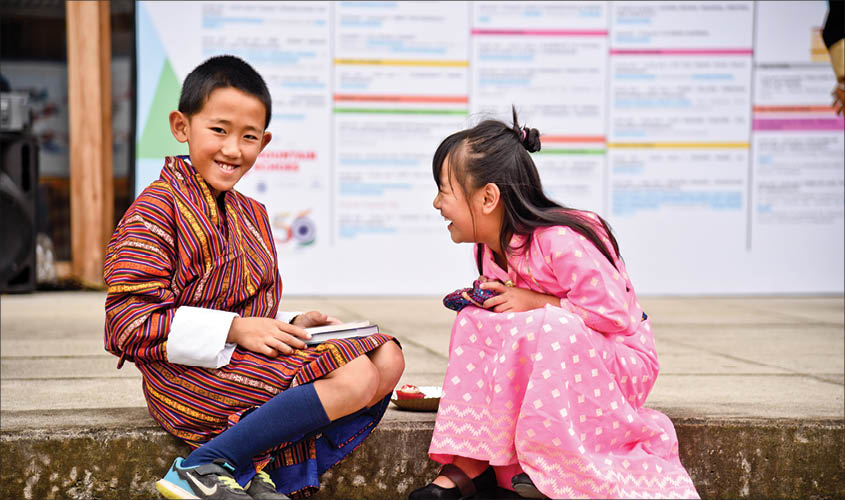Bhutan’s national language, Dzongkha, was codified only recently. As a result, more Bhutanese are comfortable reading and writing English than are conversant with Dzongkha, writes Vineet Gill.
So much in present-day Bhutan is shaped by that classic conflict between the future and the past. What sociologists call the processes of modernisation have just been unleashed here. Only a few decades ago, the national capital, Thimphu, was a backwater surrounded by Himalayan wilderness. It is an aspiring, if not exactly a thriving, metropolis today. This city—with its clubs and cars and concrete palaces—symbolises the future. But it is hemmed in from all sides by the great green hills, representatives of an ageless past. The standoff continues between the fast-urbanising valley that wants to grow further, and the wilderness that comes in the way.
In the realms of politics and culture as well, the Bhutanese people find themselves at a crossroads, where progressive values challenge traditional ways of living. To aim to strike some kind of balance is one way to resolve this tension. But that is easier said than done. Words like “tradition” ring hollow in the age of the internet. More resonant with the times are words from the new lexicon: “money” and “market”; “capital” and “global”.
Language plays an important role in the saga of Bhutan’s global awakening. There are more than 20 languages spoken in the country, and one of these was only recently accorded the privilege and high status of a written script. Dzongkha was made the official language of Bhutan as late as 1971; it is now taught in schools and is the medium of all government paperwork. Yet it remains out of reach, especially as a written language, to generations of people who came of age prior to the ’70s.
One of Bhutan’s best-known writers, Kunzang Choden was born in 1952, and with her 2005 novel, The Circle of Karma, she became, in her publisher’s words, “the first Bhutanese woman to write a novel in English”. I had a brief chat with her a few weeks ago at the venue of the Mountain Echoes literature festival, whose ninth edition was hosted in Thimphu from 23-25 August. “At the time I went to school—and all my schooling happened in India—we never learned Bhutanese. It wasn’t being taught anywhere. So English became my first written language. But now, youngsters in Bhutan are learning to write both English and Dzongkha,” she said.
Multilingualism, then, has become a fact of life for Bhutanese writers young and old. What’s more, these writers seem to be operating in the absence of a linguistic orthodoxy, which is what makes the literature of contemporary Bhutan a singular case study. How many other countries exist in the world whose national language was codified less than half a century ago?
In Karma Phuntsho’s The History of Bhutan, there’s an entire section devoted to languages. His book sheds light on the old Biblical divide separating the language of scripture (categorised as chökay) from common vernaculars (phalkay) in Bhutan. Classical Tibetan was chökay through and through—it was, as Phuntsho writes, “the Latin of the Buddhist Himalayas”, the prerogative of monks and priests. On the other hand, Dzongkha, a phalkay vulgate now based on the Tibetan script, aims to return the Promethean fire to the people. The only trouble is, Dzongkha is still struggling to gain a foothold in Bhutan. As Phuntsho writes, “…most Bhutanese speak Dzongkha imperfectly and only a few can write in Dzongkha with ease.”
At the Mountain Echoes festival, Phuntsho told me about his early education at a monastery in Karnataka, which gave him a good grounding in Classical Tibetan. “When you go for a monastic education, you come out with full command of Classical Tibetan, which means you can do Dzongkha with authority. On the whole, the orthography, the syntax and the grammar of the two languages are the same,” he said. But a monastic education remains the privilege of the few in Bhutan. Most children are enrolled in Western-style schools, where the influence of English is paramount. I was told that there are university graduates in Bhutan who sometimes misspell their names in Dzongkha. “That’s how poor or complex the situation is, because Dzongkha is a new written language, and because there is a lot of English influence in education and media.”
It is indeed a unique sort of handicap: to speak a language fluently without being able to read or write it. And this poses a peculiar challenge for young Bhutanese writers. They’re faced with another either-or dilemma, another crossroads situation: to either write in Dzongkha, and risk losing readers; or write in English, and risk losing touch with Bhutanese reality, with Bhutanese experience.
Isn’t it limiting, however, in today’s world to regard our experience of reality through the lens of one language? What many perceive as a challenge or a handicap, can well turn out to be a boon for Bhutanese literature, and indeed for Bhutanese language. In both these domains, a hybridisation of sorts is at work. The country’s literature—with most books still being written in English—is developing a dual character, composed of a dominant, cosmopolitan language on the one hand, and a provincial, unfashionable one on the other. The national language itself is under pressure thanks to the cultural hegemony of English. It may be that over the next few decades, Dzongkha would open up to outside influences, and take the road that the English language once took, when it was enriched by not resisting but absorbing a whole range of Germanic and French elements. That’s the best-case scenario for Dzongkha. But this can’t be done by the academy alone. The writers and the poets have to step forward, for it takes some creative imagination to transform a language.

